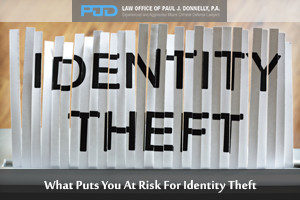- Federal Practice
-
State Practice
- Drug Crimes
- Possession of Cocaine in Florida
- Drug Possession
- Prescription Drugs
- MDMA – Molly Arrest
- Gun Crimes
- Sex Crimes
- Domestic Violence
- Violent Crimes
- Armed Robbery
- Car Jacking
- Homicide
- Manslaughter
- Violation of Probation
- Non-Florida Resident
- Theft Crimes
- Burglary
- Petty Theft/Shoplifting Charges
- Grand Theft Auto
- Receiving Stolen Property
- Misdemeanors
- Criminal Records
- Warrants
- DUI
- Multiple DUI Charges
Even though there are things that you may be doing every day to put yourself at risk for the headache of identity theft, there are also steps you can take to prevent it…
Where is the Blame?
When identity theft occurs, all your personal details have become compromised and easily available to others. This means that you are at a disadvantage and indirectly challenged to prove that you aren’t the one to be blamed.
If you want to prevent an unauthorized person from obtaining access to sensitive information, then you may want to consider an identity protection plan. A good prevention plan is instrumental in keeping your valuable personal information secure.
Limit Outside Access
The same way that you secure the door of your home by locking it, you should embrace safety measures to do the same to your identity. Keep thieves outside the door to ponder how they can access your personal financial information, but without being able to do so. Believe it or not, some of your own “bad habits” could be putting your identity at risk for theft…
Avoid Bad Habits
Believe it or not, some of your own “bad habits” could be putting your identity at risk for theft…
Try to avoid the common and everyday habits that make it easier for thieves to confiscate your information and use it to their advantage. You may have become accustomed to a certain way of doing things, and it seems quite natural to you to do them that way. But it could be hurting you in more ways than one.
Don’t Use the Internet in Public Places
Internet access in public places is usually not secure. What does that mean? For example, identity thieves love the ease of getting information that can be accessed from a public Internet café. This is especially true when you log into your bank account online and make transactions.
Try Not to Keep All Your Credit Cards in One Place
Never have all your credit cards in one place – your wallet! If you can, it is best to leave some of those credit cards at home, especially if you won’t need them all at once. If you were to lose or misplace just one of your credit cards, a potential identity thief could find it and might be able to run up a high credit card bill for you to pay.
Make sure you know what is in your wallet. Do a quick inventory. Leave out names of banks, account numbers, and authorized users from the things you keep in your wallet, if possible.
Use a Shredder
Never throw out credit card bills or other paperwork with your financial information on it without shredding them first. Identity thieves will wade through your trash to find that information. If you have a lot of paperwork that you are unable to shred, think about going to a local document store to get it done.
Use and Store Passwords Wisely
Use passwords that are unable to be detected. For example, if you use your first name, birth date, or pet’s name, an identity thief may be able to figure this out—especially with access to your other personal information. Never share your passwords via email or text. Never share them with family members or friends. It is best to store passwords in an encrypted format, whether on your computer or phone.
If you prefer to store your password on paper, then try to keep them in a safe place such as a safe.
Whether you get rid of these “bad habits” or not, identity thieves can still compromise your personal information without your knowledge. You will feel as if you are out of control. Registering for an identity monitoring service is an appropriate first step to take in order to quickly respond to a case of identity fraud.
Speak with an Experienced Identity Theft Attorney Miami
If you have been violated by an identity thief and need experienced representation, contact an attorney in your area who specializes in identity theft. Be sure to find an attorney who will fight for your rights, and seek to regain what you have lost in this ordeal.
Related Post :

